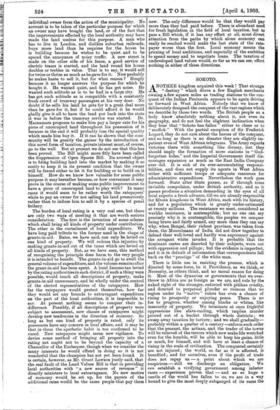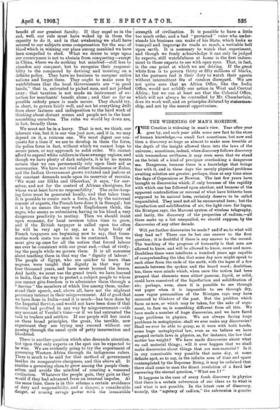SOICOTO.
ANOTIIER kingdom acquired this week ! That strange " destiny " which drove a few English merchants owning a few square Miles as trading stations to the con- quest of the Indian Peninsula appears to be again driving us forward in West Africa. Nobody that we know of deliberately designed the conquest of the vast regions which we describe by those two words. The British people as a, body know absolutely nothing about it, not even its geography, and do not feel the slightest inclination when they hear that "Sokoto has fallen" either to cheer or to " maffick." With the partial exception of Sir Frederick Lugard, they do not care about the heroes of the conquest, and so long as there is no disaster they are slightly im- patient even of West African telegrams. The Army regards victories there with something like dismay, lest they should imply the formation of more stations in " God- forgotten holes," and the Imperial Government itself dis- courages expansion as much as the East India Company ever did. It is sick of its ever-accumulating responsi- bilities, and does not supply its agents in West Africa either with sufficient troops or adequate resources for administrative expenditure. Nevertheless the work goes forward. State after State passes, as if through some invisible compulsion, under British authority, and as it passes produces a situation demanding in the eyes of all local experts a fresh advance, till we are already responsible for fifteen kingdoms in West Africa, each with its history, and for a population which is greatly under-estimated at twenty millions. The resistance we meet, considered as warlike resistance, is contemptible; but no one can say precisely why it is contemptible, the peoples we conquer being brave and fairly armed, any more than they can say why, when Bengal, their richest province, was taken from them, the Mussulmans of India did not draw together to defend their well-loved and hardly won supremacy against the arrogant white invader. It is probable that the dominant castes are deserted by their subjeCts, worn out with oppression and pillage ; but the evidence is imperfect, and it is in default of information that correspondents fall back on the " prestige " of the white man There is little use in resisting the process, which is directed by some force, be it Providence, as we think, or Necessity, as others think, and no moral reason for doing it. Most of the dynasties or governments that we over- throw in Africa are as foreign as we are, and rule by the naked right of the stronger, enforced with pitiless cruelty, and directed to perpetual plunder so ruinous that no region under its " native " rulers has even a chance of rising to prosperity or enjoying peace. There is no foe to progress, whether among blacks or whites, like insecurity of property. We terminate at once frightful oppressions like slave-raiding, which implies murder poured out of a bucket through whole districts ; we sweep away taxation by torture ; and we shall gradually— probably within a quarter of a century—enforce such order that the peasant, the artisan, and the trader of the towns will be relieved of the terrors which now make life wretched even for the humble, will be able to keep his gains, little or much, for himself, and will have at least a chance of rising in the scale of civilisation. The conquered certainly are not injured ; the world, so far as it is affected, is benefited ; and for ourselves, even if the profit of trade does not repay us a point about which we are suspicious — still we discharge an obligation. We can establish a vivifying government among inferior races — experience proves that — and as so huge a cantle of the world has fallen to us, we are in a way bound to give the most deeply subeierged of its races the benefit of our greatest faculty. If they expel us in the end, well, our rule must have waked up in them the capacity to do it, and in that awakening we shall have secured to our subjects some compensation for the sew; of blood which in winning our place among mankind we have been compelled to shed. What we desire to urge upoa our countrymen is not to abstain from conquering—except in China, where we do nothing but mischief—still less to abandon any conquest, but to recognise their responsi- bility to the conquered by devising and insisting on a definite policy. They have no business to conquer entire nations and forget them. They ought to make sure by watchfulness that the local Governments are "in good hinds," that is, entrusted to picked men, and not jobbed away ; that taxation is not made an instrument of ex- tortion for merchants' benefit alone.; and that so far as possible orderly peace is made secure. They should try, in short, to govern 'fairly well, and not let everything drift from sheer laziness and indisposition to the hard work of thinking about distant scenes and people not in the least resembling ourselves. The rules we would lay down are, in fact, broadly these.
We must not be in a hurry. That is not, we think, our inherent vice, but it is our vice just now, and it is, we may depend on it, a ruinous one. We must digest our con- quests for a time if we are to develop in them the force, the 'police force in fact, without which we cannot hope to secure peace, or any approach to solid order. We cannot afford to expend white soldiers in these swampy regions, and though we have plenty of dark subjects, it is by no means certain that we can permanently, rely upon their aid as mercenaries. We have not tried either Soudanese or Zulus, and the Indian Government grows irritated and jealous at the constant demands made upon its reservoir of recruits. We want our Sikhs and Ghoorkas,' it says, 'for our- selves, and not for the control of African aborigines, for whom we at least have no responsibility.' The order-keep- ing force must be generated locally, and that tikes time. It is possible to create such a force, for, by the universal consent of experts, the French have done it in Senegal ; but it is by no means the easy work Englishmen think, the negro, who seems so submissive, having in his blood a very dangerous proclivity to mutiny. Then we should insist upon economy, for local revenue takes time to grow, and if the British taxpayer is called upon too often he will be very apt to say, as a large body of French taxpayers are beginning now to say, that trans. marine work costs too much to be continued. Then we must give up once for all the notion that forced labour can ever be consistent with our great end,—that of vivify- ing the people while we govern them. It is all nonsense about teaching them in that way the "dignity of labour." The people of Egypt, who are quicker to learn than negroes, were taught that dignity in that way for four thousand years, and have never learned the lesson. And lastly, we must use the grand truth we have learned in India, that the way to protect a subject people to whom you cannot give freedom is to administer them through a " Service " the members of which live among them, under- stand their speech, and, above all, have not the slightest pecuniary interest in their misgovernment. All of good that we have done in India—and it is much—has been done by the Imperial Service, and would not have been done if that Service had profited in any way by misgovernment—vide any account of Verelst's time—or if we had entrusted the task to traders and settlers. If our people will but insist on these broad principles, the great, the terrible, new experiment they are trying may succeed without our passing through the usual cycle of petty insurrection and bloodshed. - There is another question which also demands attention, but upon that only, experts on the spot can be expected to be wise. We are evidently going to try the experiment of governing Western Africa through its indigenous rulers. There is much to be said for that method of government besides its comparative cheapness, and this above all. It enables a governing clasa,to grow among the people them- selves,' and avoids the mischief of creating a veneered civilisation. Whatever the people gain, they gain as they wotild if they had advanced from an internal impulse. At the same time, there is in this scheme a certain avoidance of duty and responsibility, and a danger, a considerable danger, of arming savage power with the irresistible strength of civilisation. It is possible to have a little too much order, and a bad " protected " ruler who under- stands his business can make of his State, which looks so tranquil and improves its roads so much, a veritable hell upon earth. It is necessary to watch that experiment, and though we freely acknowledge it can only be judged by experts, still watchfulness at home is the first induce- ment to those experts to see with open eyes. That, in fact, is the one point at which we are driving. If the great white firm is to govern thirty or fifty millions of blacks, let the partners feel it their duty to watch their agents without intermittent fits of careless disregard. We are not quite sure that an Africa Office, like the India Office, would not solidify our action in West and Central Africa ; but we can at least see that the Colonial Office, which will not always be controlled by Mr. Chamberlain, does its work well, and on principles dictated by statesman- ship, and not by the merest opportunism.











































 Previous page
Previous page